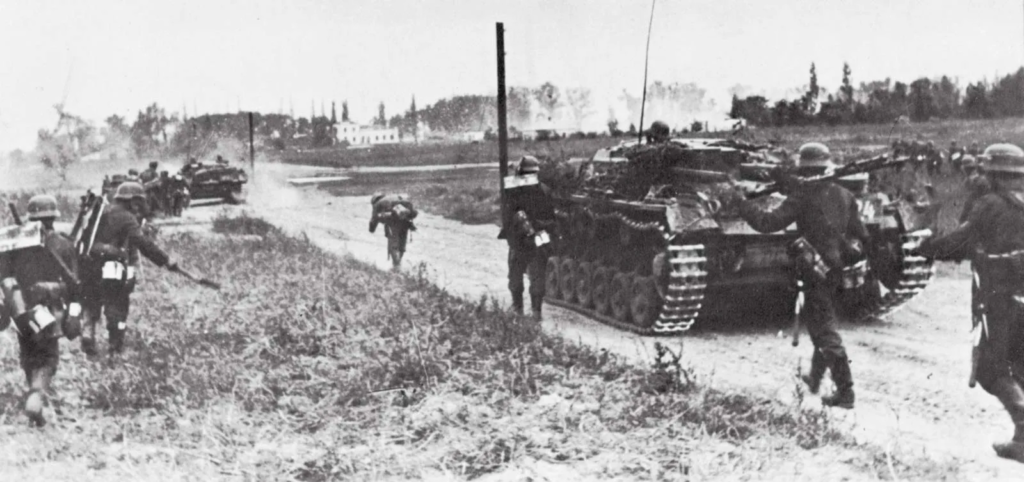As the specter of World War II loomed over the global horizon, India found itself at a critical juncture in its struggle for independence. The outbreak of war in 1939 reverberated across the Indian subcontinent, shaping the course of its political landscape and igniting fervent debates about India’s role in the conflict. The National Response to World War II stands as a pivotal chapter in India’s quest for freedom, marked by a complex interplay of ideologies, strategies, and aspirations. Against the backdrop of colonial rule, Indian leaders and movements grappled with questions of allegiance, autonomy, and opportunity amid the tumult of global conflict. This blog will delve into the multifaceted dimensions of India’s response to World War II, exploring the diverse perspectives, challenges, and legacies that emerged during this transformative period in history.

India’s Involvement
- The Second World War began in 1939 when Germany invaded Poland under Hitler’s expansionist agenda.
- The Indian government decided to enter the war without consulting the Indian National Congress or elected members of the central legislature.
- Before joining the war, Congress leaders demanded either India’s freedom or effective power transfer to Congress, which the British government rejected.
- In response to the British refusal, Congress ministers resigned from provincial governments.
- Mahatma Gandhi called for limited Satyagraha (nonviolent resistance) in October 1940.
- By March 1942, Japan had swiftly conquered several territories in Southeast Asia, bringing the war closer to India’s borders.
- The British government urgently sought Indian participation in the war effort to counter the Japanese threat as the war approached India’s shores.
National Movements and World War
- Cripps Mission: In March 1942, the British government sent Sir Stafford Cripps to India to seek cooperation from Indian leaders.
- British Policy Goal: Cripps stated that Britain aimed to grant self-government to India as soon as possible.
- Failed Negotiations: Talks between British officials and Congress leaders collapsed when Britain refused the Congress’ demand for immediate power transfer.
- Quit India Movement: On August 8, 1942, the Congress passed the ‘Quit India’ Resolution, advocating a nonviolent struggle for independence led by Gandhi.
- Arrests and Protests: Gandhi and other leaders were arrested the next day, leading to widespread protests, strikes, and civil disobedience acts.
- Government Crackdown: The government responded harshly, using force and repression to quell the movement.
- Suppression: The movement was eventually crushed, leading to reduced political activity until the war’s end in 1945.
- Azad Hind Fauj (Indian National Army):
- Bose’s Actions: Subhas Chandra Bose sought support first from the Soviet Union, then Germany, before forming the Azad Hind Fauj in Singapore in 1943.
- Military Campaign: The INA, aligning with Japan, aimed to liberate India, joining them in their advance from Burma.
- Japan’s Defeat: With Japan’s defeat in 1944-45, Bose died in a plane crash, and the focus of the national movement shifted outside India.
These events led to a decrease in political activity within India until the war ended.
Role of India in World War II
- Diverse Indian Contribution: Men and women from different backgrounds in India joined hands to fight against fascism during the war.
- Merchant Supply Ships: Indian crew members worked on merchant ships, delivering vital supplies and food to soldiers in Europe.
- Medical Personnel: Indian doctors and nurses played a crucial role in providing medical care on the battlefield and in hospitals abroad.
- Indian Comforts Fund (ICF): Started in 1939, the ICF provided soldiers and Asian prisoners of war with food, warm clothes, and other essentials, thanks to contributions from Indian and British women.
The Second World War changed the world a lot. New organizations like the United Nations were created to help countries work together and prevent conflicts. The war also made the Soviet Union and the United States very powerful, leading to a tense period called the Cold War.
In Europe, the war caused a lot of damage and made the big countries weaker, so many colonies in Africa and Asia gained independence. Even though many places were destroyed, countries started to rebuild and improve their economies after the war. Some places in Europe tried to work together more closely to avoid future wars.
Overall, the Second World War was a big deal that changed how countries interacted, and its effects are still felt today. We learned from the war that it’s important for countries to talk to each other, work together, and try to keep the peace.
Also Read: Congress Rule in Provinces